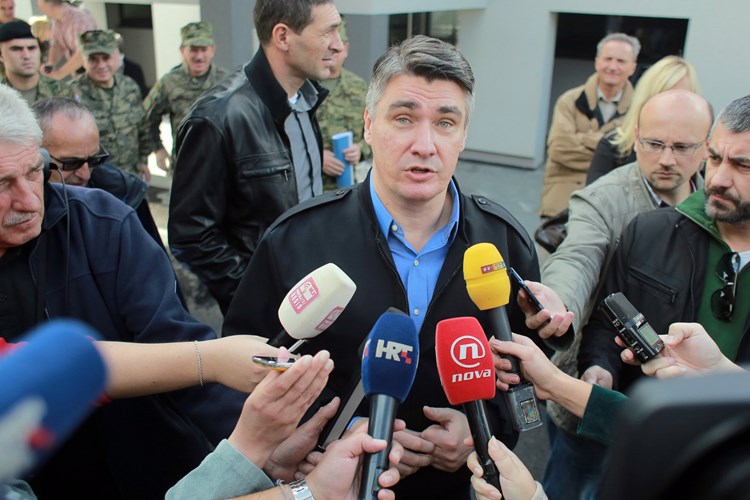- Published: 17.10.2015.
PM Milanovic says Germany, Austria, Sweden told him not to build fence on border
Prime Minister Zoran Milanovic said on Saturday that he had asked the leaders of Germany, Austria and Sweden at a recent European Council session if they were in favour of Croatia putting up a fence on its border, like Hungary, to stop the flow of refugees and migrants, and that they told him not to do it.
After Hungary sealed off its border with Croatia early on Saturday to stop refugees and migrants and announced that it would suspend the Schengen regime on its border with Slovenia, reporters asked Milanovic if the government still had "things under control."
"I think everything is clear already. After all the pushing and shoving over the past month, the attempts to sabotage the government from successfully keeping things under control, and we are successfully keeping things under control, this thing has reached its finale. We have an official statement from Berlin, where they say that Hungary's move is something they don't agree with, which makes the situation harder, which simply isn't good. If Germany must to say that, where all these people are headed, then It's perfectly clear who's on the right side here and who's totally losing it, in Budapest, and in Croatia too."
Milanovic said he knew well how someone stood and was seen in the European Council and that "building some kind of wall is the last solution." "I openly put this question at the European Council, provocatively, to those who are the primary recipients of the refugees, not the Hungarians, not the Czechs, but the Austrians, the Germans and the Swedes, 'Are you in favour of us building a wall? Only if you are, we are willing to think about it... They said, Don't do it."
He said that from yesterday's statement from Berlin "it's clear who in this crisis is noble and organised and looking a step further, and who is building walls out of petty interests... They will be sorry later and they have allies in Croatia, very loud, very destructive ones... they just want chaos in Croatia, for a bomb to go off... for the rivers to flood, for the displaced and the migrants to spiral out of control. It won't happen."
Milanovic said the relations with Slovenia worked because Slovenia was a different state. He said he was in constant contact with Slovenian PM Miro Cerar and that building a fence on its border "is simply unacceptable behaviour in Slovenia."
Asked if President Kolinda Grabar-Kitarovic had informed him about her recent talks with Hungarian officials about Croatia's oil company INA and Hungary's MOL, Milanovic said he did not know who she talked with but that he was "confident that she is doing everything she can in Croatia's interest." "If she is willing to help the government, which is responsible, in Croatia's interest, I'm here."
He recalled that he had openly asked Hungary to extradite former MOL CEO Zsolt Hernadi. "He's on an Interpol warrant. We are after him... because of founded suspicion that he was involved in crime in one EU member state, Croatia." He said the explanation preventing the extradition was unclear. "There is founded suspicion that the man committed a major crime, too much points to that. Two years later, this is a conspiracy to protect the man."
Milanovic said things in Croatia worked differently, citing extraditions to Germany. "The courts in Croatia are independent. I don't have to agree with a court's decision sometime, but I can't tell a court or the prosecutor's office what to do. There's a unity of government in Hungary, such as in Croatia under HDZ rule in the 90s. Some formed themselves in that political ambient and can't outlive it. Hungary functions like that even today, one leader, one party... one prosecution, one judicial system, one government and one parliament. That's not good. We are different because we are a more complex society."
(Text & photo: HINA)
(Text & photo: HINA)
